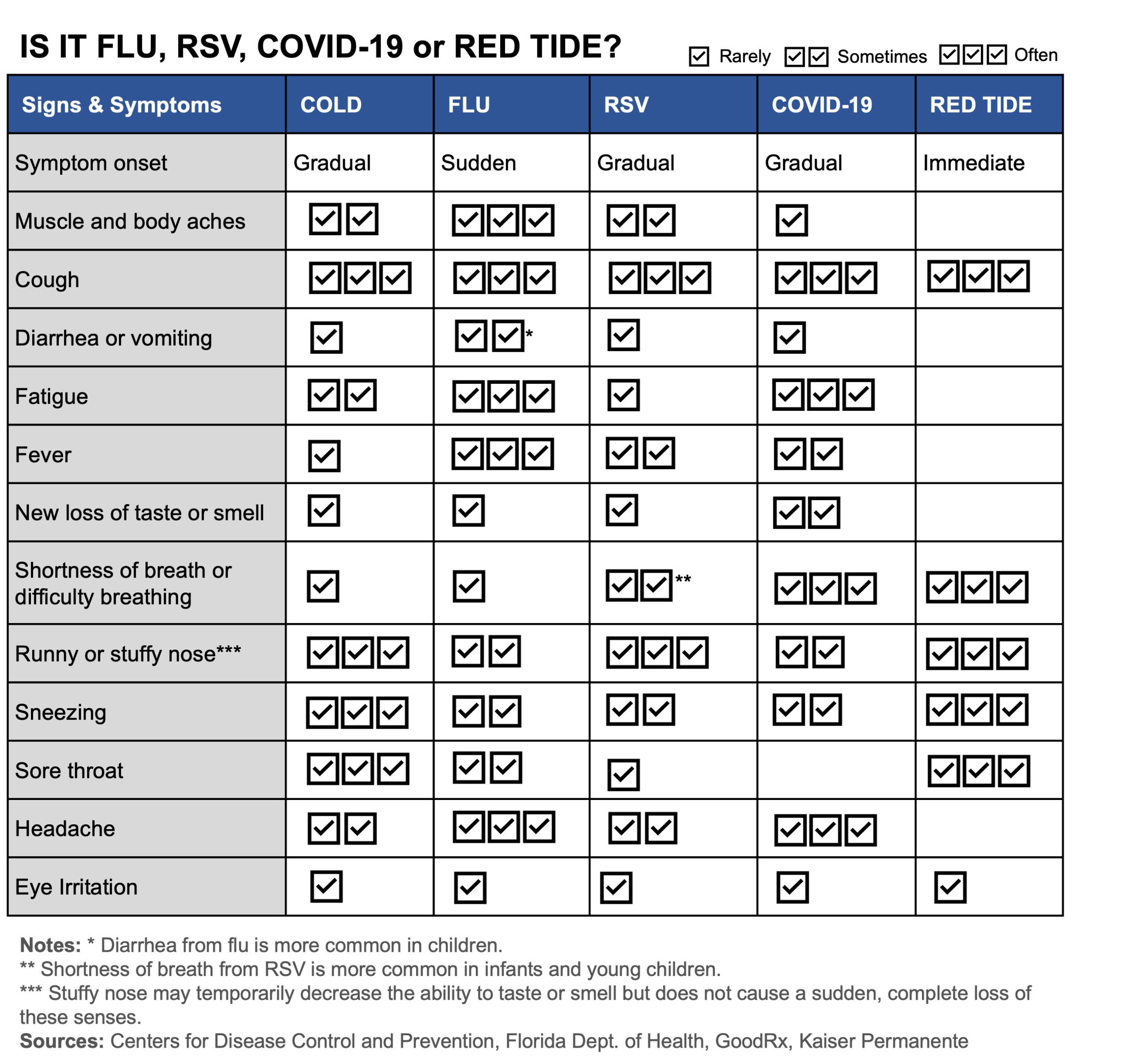Ask a Doc: Trouble breathing? Respiratory illnesses & hurricane cleanup

As we settle into November here in Boca Grande, the challenges of hurricane recovery are matched by the need to stay vigilant about our health. The Boca Grande Health Clinic is already busy with cases of seasonal respiratory illnesses. At this time of year, colds, flu, and RSV (respiratory syncytial virus) are common, while COVID-19 continues to circulate and red tide blooms along our coast, adding to respiratory concerns. Bret Kueber, MD, Assistant Medical Director at the Clinic, tells us what you need to know to stay healthy.
How can I tell what’s causing my symptoms?
Diagnosing yourself can be tricky because the common cold, flu viruses, RSV and even red tide share many similar symptoms. The Clinic can perform a four-in-one rapid test to detect SARS-CoV-2, Influenza A, Influenza B and RSV. It’s a simple nasal swab done at the Clinic and test results are available in under 40 minutes.
If your shortness of breath is accompanied by chest pain, fainting, nausea, a bluish tinge to lips or nails, or a change in mental acuity, seek emergency medical help, as these may be signs of a heart attack.
How can I reduce my risk of catching a cold this season?
Colds are common this time of the year and can disrupt your daily routine, even though they’re usually mild. Here are a few tips to help protect yourself:
• Practice good hand hygiene by washing your hands regularly with soap and water.
• Avoid close contact with those who are ill, and if you’re feeling under the weather, try to rest at home to recover.
• Stay hydrated and get enough rest: Both can help your immune system stay strong.
When should I get a flu shot?
Flu season is here. If you haven’t already been vaccinated this year, the best time to do it is now. Here’s why it’s important:
• Vaccinate before you return to the island to help reduce the spread of flu within the community, especially among high-risk individuals.
• Consider antiviral medications if you’re in a high-risk group and feel flu symptoms. Discuss options with your doctor.
• Stay home if you’re feeling unwell to help reduce the spread to others.
What should I know about RSV?
Respiratory syncytial virus (RSV) can be particularly concerning for infants, young children and seniors, as it may lead to serious respiratory problems. Here are some preventive steps:
• Consider getting vaccinated if you are 75 years and older or are 60-74 and in a high-risk group.
• Limit exposure to crowded areas if you or your loved ones are at high risk.
• Look out for symptoms like wheezing, coughing, and breathing difficulties, especially in children or elderly family members.
• Practice frequent handwashing and surface disinfection to reduce the spread of RSV.
Is COVID-19 still something I should be concerned about?
COVID-19 continues to circulate, and even though it’s not seasonal, cases can still rise with more gatherings. Here’s how you can protect yourself:
• Get vaccinated and stay current with boosters before returning to the island, especially if you’re at higher risk for severe illness.
• Wear a mask in crowded or high-risk settings for added protection, especially indoors.
• Get tested if symptoms appear: Since COVID-19 symptoms can resemble those of colds or flu, testing is important to guide your next steps.
What should I know about red tide right now?
Red tide is currently in bloom in our area and can cause respiratory irritation, especially for people with asthma or other lung conditions.
• Check red tide reports before heading out.
• Avoid going out if you have respiratory issues on days when red tide levels are high.
•Rinse off with fresh water after exposure to help reduce irritation.
• Wear a mask for added protection.
What other tips can help us stay well during hurricane recovery?
Recovery can be physically and mentally taxing, so it’s essential to care for your health and well-being. Here’s how:
• Stay hydrated and focus on balanced meals to maintain energy and immune health.
• Prioritize rest and sleep: Recovery work demands energy, and rest is crucial for staying healthy.
• Keep up with hand hygiene and cover coughs or sneezes to prevent spreading germs.
• Wear a mask during cleanup efforts.









